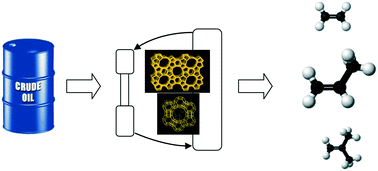Crude oil to chemicals: light olefins from crude oil
Abstract
The possibility to fulfill the increasing market demand and producers' needs in processing crude oil, a cheap and universally available feedstock, to produce petrochemicals appears to be a very attractive strategy. Indeed, many petrochemicals are produced as side streams during crude oil refining, which primary goal remains transportation fuel production. Availability of some critical feedstocks may then depend on local refining policy. In order to improve flexibility, it has been proposed to directly crack crude oil to produce petrochemicals, in particular light olefins (ethylene, propylene, butenes), using technologies derived from fluid catalytic cracking. This paper attempts to review the main research works done on the topic in the literature in the last five decades, focussing on process as well as catalyst technology, with a special interest for fluid catalytic cracking (FCC) based technology that can be used towards maximizing chemicals from crude oil. Factors investigated include use of severe cracking conditions, on-purpose additives (from ZSM5 to more exotic, metal doped additives), recycle streams and multiple riser systems.

- This article is part of the themed collection: 2017 Catalysis Science & Technology HOT Articles

 Please wait while we load your content...
Please wait while we load your content...